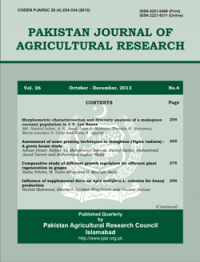Effect of Sewage Water Irrigation Frequency on Growth, Yield and Heavy Metals Accumulation of Tomato and Okra
Safina Naz1*, Muhammad Akbar Anjum1, Bushra Siddique2, Syed Atif Hasan Naqvi3*, Sajid Ali1, Hassan Sardar1, Sakeena Tul Ain Haider1, Muhammad Asif Zulfiqar4, Hajra Azeem3, Sibghat Ullah5, Shah Pasand6 and Zehri Khan5
ABSTRACT
The current study was aimed to inspect the efficiency of different sewage water irrigation frequency treatments on growth, yield and heavy metals accumulation of tomato and okra during 2012 and 2013. A statistical randomized complete block design was applied in the field to perform experiments having three replicates while 03 sewage water irrigation frequency treatments i.e., 5, 10 and 15-days interval. The tomato yield, their growth along with the production of the plant biomass were increased considerably with more repetitive (interval of five days) application of the sewage water. While reasonably less repetitive application (interval of fifteen days) of sewage water cause the less production of biomass, yield and growth. Moderately less repetitive applications (interval of ten days) of sewage water showed a significant increase in the addressed attributes of production in okra. The yield, as well as growth aspects of the okra, were reduced noticeably by using the reasonably less repetitive application. Frequent sewage water application resulted in an increased amount of Fe, Cu, Pb, Cr, Ni and Cd in okra pods and tomato fruits than moderately and less repetitive irrigation. The leaves and root of okra and tomato displayed the higher contents of metal when these crops were cultivated with a repetitive application of the sewage water. The final result revealed that the metal concentration high in tomato and okra plant parts with decreasing irrigation intervals of sewage water.
To share on other social networks, click on any share button. What are these?






